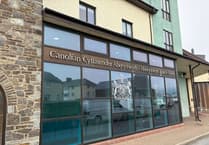An Aberystwyth railway company has completed the restoration of a locomotive on behalf of Gwynedd's Welsh Highland Heritage Railway.
The Vale of Rheidol Railway has restored Baldwin Locomotive ‘794’, and staff there have told the Cambrian News more about its history.
It was built in January 1917 at The Baldwin Locomotive Works in Philadelphia, USA, as works number 44699, the engine is a 4-6-0T of the Baldwin class 10-12-D. Given the number 794, like many of its class the engine was shipped to Europe for use with the Railway Operating Division (ROD), in support of the ever changing front lines.
In total 495 locomotives in this class were ordered from Baldwin and delivered to Europe, of which nine engines were lost in transhipment.
The engines were rugged and generally reliable in service, designed to operate on temporary tracks to the rear of allied forces.
The uneven tracks used by the War Department Light Railways led to occasional derailments when the engines were running in reverse; this was believed to be as the engines had no trailing truck under the footplate.
The engines were also known to derail themselves when left for any period on the uneven tracks of the western front; this was due to the water transferring via the balance pipe from the higher side tank to the lower one, which caused the engines to fall over sideways.
After service on the Western Front during 1917-18 (exact whereabouts unknown) ‘794’ was one of a group of 50 similar locomotives sent to India by the government for service in the North West Frontier area, in modern-day Pakistan. It subsequently found its way to the Daurala Light Railway, about 50 miles north west of Delhi, and hence to the nearby Khatauli Sugar Plantation, where it became their no 1 and received the name ‘Tiger’.
Repatriated to the UK in about 1985, the Locomotive was owned by The Imperial War Museum before being acquired by the Welsh Highland Heritage Railway recently. In June 2004, ‘794’ arrived on the Welsh Highland Heritage Railway, Porthmadog, where restoration began.
The original ‘590’ was built in March 1917 at the Baldwin works in Philadelphia. The engine was damaged during service on the western front, and was sent to Bagnall’s of Stafford in January 1919 for rebuilding. Purchased from the government properties disposal board by Colonel Stephens, for work on the Welsh Highland Railway (WHR) the engine arrived at Dinas Junction on 4 July 1923.
Owing to the size of the locomotive it was restricted to use on the WHR, never seeing use on the Ffestiniog Railway, which has a restricted loading gauge. During 1934 ‘590’ was sent to Boston Lodge Works for a refit and at that time it was turned around to face Dinas.
After passenger services terminated in 1936, the engine was sent to Boston Lodge for storage and then moved to Dinas in June 1937. ‘590’ stayed at Dinas until August 1942, when Cohen’s (the contractor commissioned to scrap the WHR permanent way) attempted to steam the engine, however they were unsuccessful owing to the amount of steam leaks, after this the engine was cut up for scrap. One of its side tanks survived as an oil storage container in a contractor’s yard.
The Vale of Rheidol Railway was given the contract to complete the overhaul of the locomotive. The works took several years, but in May 2023, the locomotive made its first moves around the yard in Aberystwyth and several test runs between Aberystwyth and Aberffrwd. Once completed it was transported by low loader to the Ffestiniog & Welsh Highland Railway for further testing and then finally onto it's new home at Gelert's Farm on the Welsh Highland Heritage Railway.
The engine will be unveiled tomorrow morning, Saturday, 27 May at a ceremony for donors and supporters of the restoration fund.
The public will have an opportunity to see and travel behind Baldwin ‘WHR 590’ when it operates normal WHHR services from 2pm on Saturday, 27 and then for the whole of Sunday, 28 May.
The public will also have the chance to travel behind the engine when it takes part in the Welsh Highland Railway Centenary Celebrations, which will take place over the long weekend of 23, 24 and 25 June.





Comments
This article has no comments yet. Be the first to leave a comment.